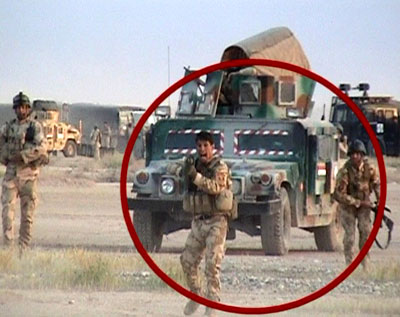 Reuters: As the clock ticks towards the end of America’s military presence in Iraq, there are increasingly dire warnings of a humanitarian disaster unless steps are taken to protect more than 3,000 Iranian dissidents living in a camp in Iraq. How closely is Washington listening?
Reuters: As the clock ticks towards the end of America’s military presence in Iraq, there are increasingly dire warnings of a humanitarian disaster unless steps are taken to protect more than 3,000 Iranian dissidents living in a camp in Iraq. How closely is Washington listening?
Reuters
By Bernd Debusmann
Bernd Debusmann is a Reuters columnist. The opinions expressed are his own.
 WASHINGTON, Nov 3 (Reuters) – As the clock ticks towards the end of America’s military presence in Iraq, there are increasingly dire warnings of a humanitarian disaster unless steps are taken to protect more than 3,000 Iranian dissidents living in a camp in Iraq. How closely is Washington listening?
WASHINGTON, Nov 3 (Reuters) – As the clock ticks towards the end of America’s military presence in Iraq, there are increasingly dire warnings of a humanitarian disaster unless steps are taken to protect more than 3,000 Iranian dissidents living in a camp in Iraq. How closely is Washington listening?
Gloomy forecasts for the fate of the exiles at Camp Ashraf, north of Baghdad near the border with Iran, have come from Amnesty International, a long string of prominent former U.S. government officials, retired generals, and members of the European Parliament. One of them, Struan Stevenson, predicts “a Srebrenica-style massacre,” a reference to the 1995 killing of more than 8,000 Bosnian Muslims during the Bosnian War.
Stevenson, who is head of the European Parliament’s delegation on Iraq, issued his warning this week in an op-ed in the conservative Washington Times newspaper. Also this week, Amnesty International said there was a “serious risk of severe human rights violations” if the Iraqi government went ahead with plans to force the closure of the camp by the end of December.
On a more subdued note, the administration of President Barack Obama, long silent on the exiles, is also expressing concern. U.S. officials, according to a State Department spokesman, are impressing on the Iraqi government the importance of treating the residents of Camp Ashraf humanely.
How seriously the Iraqis are taking American exhortations is open to doubt. U.S. influence in Iraq is waning rapidly while that of Iran is rising.
Iran’s supreme leader, Ayatollah Ali Khamenei, has repeatedly urged Iraq to expel the exiles. They belong to the Mujahedin-e-Khalq — or the People’s Mujahideen Organization of Iran (PMOI) — once a powerful armed group that staged raids into Iran between 1986 and 2001, when it renounced violence. The PMOI handed over its weapons to U.S. invasion forces after the fall of Saddam Hussein in 2003.
After being vetted for possible involvement in terrorist activities, the PMOI members at Ashraf were granted “Protected Person” status under the Fourth Geneva convention and the U.S. military assumed control of the camp. That was a bizarre twist even by the standards of the Middle East because the PMOI remained on the U.S. government’s list of terrorist organizations.
American protection of the camp ended in January 2009, when the U.S. transferred control to the Iraqi government. According to testimony to a Congressional hearing, that transfer followed an explicit and written assurance by the Iraqi government that it would respect the protected status of Ashraf residents.
Just seven months later, Iraqi security forces stormed into the camp, whose inhabitants include around 1,000 women. In the ensuing clashes, at least nine residents were killed and scores injured. On April 8, 2011, Iraqi security forces moved into the camp again, using what Amnesty International termed “grossly excessive force and live fire.” Thirty-six residents were killed and more than 300 wounded.
So much for respecting assurances to the Americans.
LACK OF RESPECT
That lack of respect, prominent U.S. supporters of the PMOI say, has its roots in a 1997 decision by the Clinton administration to put the PMOI on the State Department’s list of foreign terrorist organizations. In the words of Louis Freeh, who was director of the Federal Bureau of Investigation (FBI) at the time, the move was part of “a fruitless political ploy to encourage a dialogue with Tehran” without evidence that the group posed a threat to the United States.
In an op-ed article in the New York Times, he added: “Tragically, the State Department’s unjustified terrorist label makes the Mujahedin’s enemies in Tehran and Baghdad feel as if they have license to kill and trample on the written guarantees of protection given to the Ashraf residents by the United States.”
There is an obvious irony in the fact that practically the only thing the American and Iranian governments have in common is their designation of the PMOI as a terrorist organization. But that has done nothing to accelerate a State Department review of the label ordered by a federal court in Washington on July 16, 2010.
(The European Union took the group off its list in 2009. Britain did so in 2008, on a court ruling that called the designation “perverse.”)
Fifteen months later, Secretary of State Hillary Clinton, in an interview with a Voice of America program in Farsi, noted that the EU had taken the PMOI off its terrorist list “after a very thorough assessment” that came to the conclusion there was no evidence of terrorist activity. “We’re still assessing the evidence here in the United States.”
Judging from the snail’s pace of that assessment, there is no sense of urgency about the matter. That’s something the Obama administration might come to regret.


